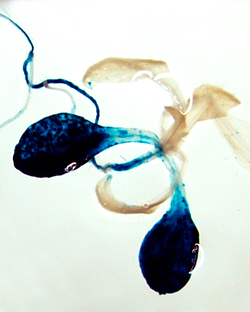Former GMI members from the Mittelsten Scheid group describe a new RdDM function which reinforces silencing of transposable elements in shoot apical meristems during early growth. Tuncay Baubec, now at the Friedrich Miescher Institute for Biomedical Research (Basel) and Ales Pecinka, now at the Max Planck Institute for Plant Breeding Research (Cologne), uncovered a mechanism that ensures correct epigenetic inheritance during the transition from vegetative to reproductive phases and between generations. The article has been recommended by F1000 Prime (Faculty of 1000).
Abstract
In plants, transposable elements (TEs) are kept inactive by transcriptional gene silencing (TGS). TGS is established and perpetuated by RNA-directed DNA methylation (RdDM) and maintenance methylation pathways, respectively. Here, we describe a novel RdDM function specific for shoot apical meristems that reinforces silencing of TEs during early vegetative growth. In meristems, RdDM counteracts drug-induced interference with TGS maintenance and consequently prevents TE activation. Simultaneous disturbance of both TGS pathways leads to transcriptionally active states of repetitive sequences that are inherited by somatic tissues and partially by the progeny. This apical meristem-specific mechanism is mediated by increased levels of TGS factors and provides a checkpoint for correct epigenetic inheritance during the transition from vegetative to reproductive phase and to the next generation.
Original Publication
Baubec T, Finke A, Mittelsten Scheid O, Pecinka A (2014) Meristem-specific expression of epigenetic regulators safeguards transposon silencing in Arabidopsis. EMBO reports. doi: 10.1002/embr.201337915
